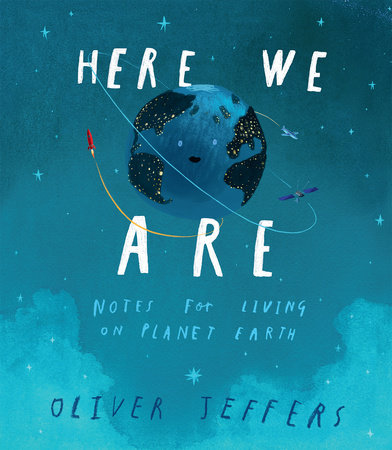Year 5-6 Parent / Child workshop
Text: Here we are - Oliver Jeffers
lesson plan by Andrew Moffat / equalitiesprimary |
Learning intention: To consider what we don't know (yet)
|
Success criteria: I know things / I know I don't know things / I know how I can find out about new things / I am excited about my future
|
Starter: Look at the front cover of the book. What do think this book is going to be about? There are 36 pages in this book; what do you think the author is going to include? Who do you think the book is written for?
After discussion open the book and read the introduction page "To my son, Harland..." What does this tell us about the aims of the book and why it was written?
|
Main: Read “Here we are” start to finish without stopping for discussion. At the end give each child and their adult time to discuss the book. Put the following questions on the board to consider:
- What were the author's aims?
- What does the author say about earth and who lives here?
- If you have questions, what does the author advise?
- Why does the author say, "You're never alone on earth" at the end? What do you notice about the people?
|
Role play: The end of the book tells us to ask questions if we need to know something. We all know things, but does any person on earth know everything? Ask each child and adult to think about the things they know and don't know. Give out small cards of two different colour and ask each child and parent to write things they do know on one colour and things they don't know on the other, then collect the cards in and have two different piles of card; one pile for things we do know and one for things we don't. For example, do you know about different faiths? Do you know how aeroplanes fly? Can you explain lightning? In the book what does the author suggest we do if we have a question? (ask someone). Choose some "don't know" cards and read them out (you don't need to identify who wrote the cards); does anyone in the room know an answer or have explanations? Is there anyone else we can ask outside the room? (People might suggest we look up the answer on the internet; agree to this and remind people that all answers on the internet were also written by a person so someone somewhere knows the answer)
|
Activity: Look at the very last page where the author says; "There are only three words you need to live by, son: respect, consideration and tolerance." Identify definitions for these words; discuss why do you think the author chose these words?
Each child and parent create a piece of art for three words we need to live by. People can use the words given by the author in the book or choose three new words. Encourage people to consider the aims of the book if they choose new words.There are many pages in the book that could be chosen as a stimulus for art. The page depicting the diverse people in the world is also key.
|
Plenary: Why do you think the author wrote the book? Is there a message in this book? How do you think the author wants his son to live as he grows up? Revisit the original Learning Intention: How do we find out about things we don't know? Is there an age where people stop learning? In the book the author says "we haven't quite worked everything out, so there is plenty left for you to do"; what does he mean?
|
Afl questions: How does this book relate to No Outsiders? What can we learn from this book?
|
For more parent/ child No Outsiders workshops to use in schools see:
